统编九年级英语Unit5知识点总结
九年级英语un t 5知识点归纳
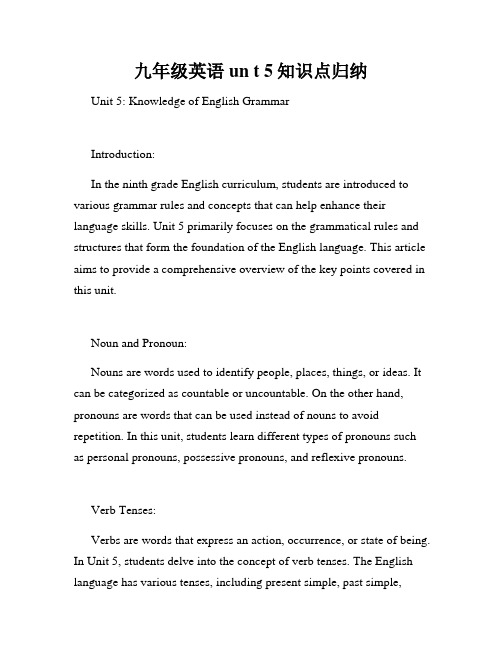
九年级英语un t 5知识点归纳Unit 5: Knowledge of English GrammarIntroduction:In the ninth grade English curriculum, students are introduced to various grammar rules and concepts that can help enhance their language skills. Unit 5 primarily focuses on the grammatical rules and structures that form the foundation of the English language. This article aims to provide a comprehensive overview of the key points covered in this unit.Noun and Pronoun:Nouns are words used to identify people, places, things, or ideas. It can be categorized as countable or uncountable. On the other hand, pronouns are words that can be used instead of nouns to avoid repetition. In this unit, students learn different types of pronouns such as personal pronouns, possessive pronouns, and reflexive pronouns.Verb Tenses:Verbs are words that express an action, occurrence, or state of being. In Unit 5, students delve into the concept of verb tenses. The English language has various tenses, including present simple, past simple,present continuous, past continuous, present perfect, past perfect, and future tenses. Each tense is used to describe different time frames and situations.Adjectives and Adverbs:Adjectives are used to describe or modify nouns, while adverbs modify verbs, adjectives, or other adverbs. By using descriptive words effectively, students can enhance their writing and make it more engaging for the reader.Prepositions:Prepositions are words that show the relationship between a noun or pronoun and other words in a sentence. Common prepositions like "in," "on," and "at" are used to indicate time, place, or manner. Mastering prepositions is crucial for students to express their ideas and communicate effectively.Conjunctions:Conjunctions are words that join words, phrases, or clauses together in a sentence. Students learn about coordinating conjunctions such as "and," "but," and "or," as well as subordinating conjunctions like"because" and "although." These conjunctions enable students to express complex thoughts and create more coherent writing.Modifiers:Modifiers are words or phrases that provide additional information and enhance the meaning of a sentence. In this unit, students explore different types of modifiers, including adjectives, adverbs, and phrases. Understanding modifier placement and usage is essential to convey precise meanings in writing.Direct and Indirect Speech:Direct speech involves quoting someone's exact words, while indirect speech is paraphrasing someone's statements. Students learn to convert direct speech into indirect speech and vice versa. This skill helps convey information accurately and adds variety to their writing or speaking.Conditional Sentences:Conditional sentences express a hypothetical situation and its possible consequences. Students familiarize themselves with different types of conditionals, such as zero, first, second, and third conditionals.By utilizing conditional sentence structures correctly, students can express assumptions, probabilities, or consequences effectively.Conclusion:Unit 5 provides students with a comprehensive understanding of essential English grammar rules and structures. By mastering these concepts, students can improve their writing, reading, listening, and speaking skills. Developing a strong foundation in grammar enhances students' ability to express themselves fluently and accurately, leading to greater success in their English language journey. Mastery of these grammar skills will serve as a solid base for further language development in future grades.。
九年级英语Unit 5知识归纳
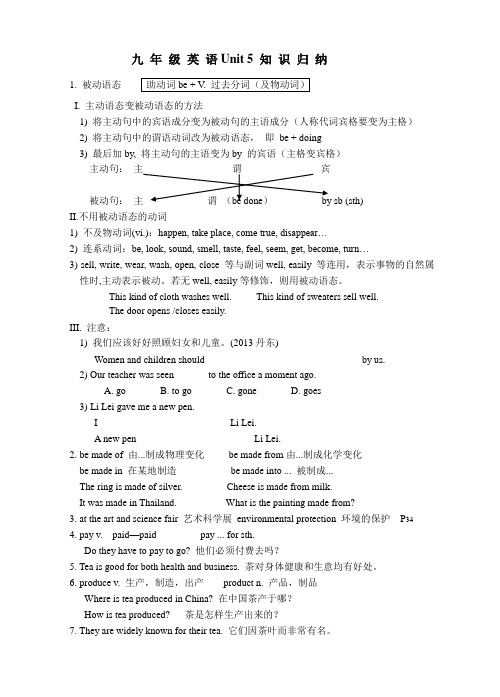
九年级英语Unit 5 知识归纳1. 被动语态I. 主动语态变被动语态的方法1) 将主动句中的宾语成分变为被动句的主语成分(人称代词宾格要变为主格)2) 将主动句中的谓语动词改为被动语态,即be + doing3) 最后加by, 将主动句的主语变为by 的宾语(主格变宾格)主动句:主谓宾被动句:主谓(be done)by sb (sth)II.不用被动语态的动词1) 不及物动词(vi.):happen, take place, come true, disappear…2) 连系动词:be, look, sound, smell, taste, feel, seem, get, become, turn…3) sell, write, wear, wash, open, close 等与副词well, easily 等连用,表示事物的自然属性时,主动表示被动。
若无well, easily等修饰,则用被动语态。
This kind of cloth washes well. This kind of sweaters sell well.The door opens /closes easily.III. 注意:1) 我们应该好好照顾妇女和儿童。
(2013丹东)Women and children should _______________________________ by us.2) Our teacher was seen ______ to the office a moment ago.A. goB. to goC. goneD. goes3) Li Lei gave me a new pen.I __________________________ Li Lei.A new pen _______________________ Li Lei.2. be made of 由...制成物理变化be made from由...制成化学变化be made in 在某地制造be made into ... 被制成...The ring is made of silver. Cheese is made from milk.It was made in Thailand. What is the painting made from?3. at the art and science fair 艺术科学展environmental protection 环境的保护P344. pay v. paid—paid pay ... for sth.Do they have to pay to go? 他们必须付费去吗?5. Tea is good for both health and business. 茶对身体健康和生意均有好处。
九年级unit5基础知识点
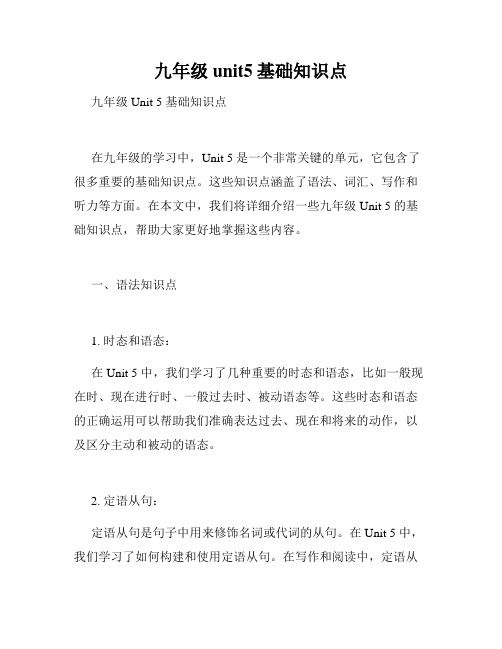
九年级unit5基础知识点九年级 Unit 5 基础知识点在九年级的学习中,Unit 5 是一个非常关键的单元,它包含了很多重要的基础知识点。
这些知识点涵盖了语法、词汇、写作和听力等方面。
在本文中,我们将详细介绍一些九年级 Unit 5 的基础知识点,帮助大家更好地掌握这些内容。
一、语法知识点1. 时态和语态:在 Unit 5 中,我们学习了几种重要的时态和语态,比如一般现在时、现在进行时、一般过去时、被动语态等。
这些时态和语态的正确运用可以帮助我们准确表达过去、现在和将来的动作,以及区分主动和被动的语态。
2. 定语从句:定语从句是句子中用来修饰名词或代词的从句。
在 Unit 5 中,我们学习了如何构建和使用定语从句。
在写作和阅读中,定语从句可以帮助我们更精确地描述事物,并且让句子更加丰富和有层次感。
3. 状语从句:状语从句是句子中用来表示时间、原因、条件、目的、结果等的从句。
在Unit 5 中,我们学习了如何使用不同类型的状语从句。
状语从句的运用可以帮助我们更准确地表达自己的意思,并且让语言更具连贯性和流畅性。
二、词汇知识点1. 单词拼写:在 Unit 5 中,我们学习了很多新的单词,并且需要掌握它们的正确拼写。
拼写正确的单词可以让我们的写作更加规范和地道,同时也提高了我们的阅读理解能力。
2. 同义词和反义词:在 Unit 5 中,我们也学习了一些同义词和反义词。
通过学习这些词语,我们可以扩展自己的词汇量,并且在写作和阅读中更加丰富我们的表达。
三、写作知识点1. 句型多样化:在写作中,我们需要尽量避免使用重复的句型,而是要多样化地表达自己的意思。
在 Unit 5 中,我们学习了一些新的句型和表达方式,可以帮助我们更好地组织和呈现自己的观点。
2. 写作连贯性:写作时,我们需要注意句子之间的连贯性。
通过使用适当的过渡词和连接词,我们可以使句子更流畅,段落更有逻辑性。
在Unit 5 中,我们学习了一些常用的连接词,比如however、therefore、in addition等。
九年级英语Unit 5知识学习总结要点汇总
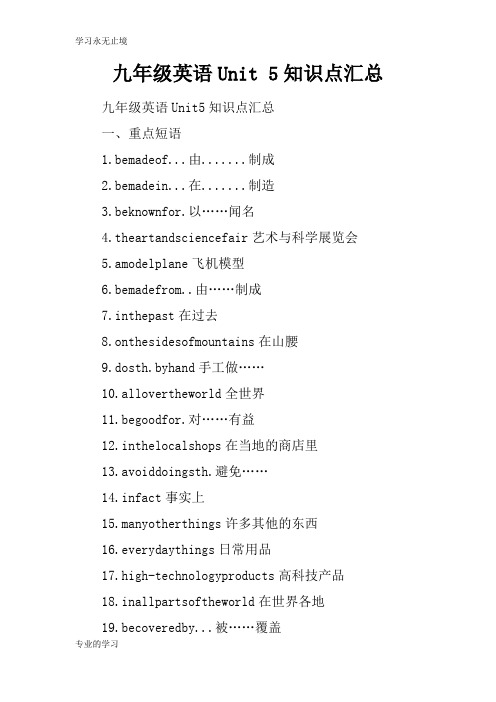
九年级英语Unit 5知识点汇总九年级英语Unit5知识点汇总一、重点短语1.bemadeof...由.......制成2.bemadein...在.......制造3.beknownfor.以……闻名4.theartandsciencefair艺术与科学展览会5.amodelplane飞机模型6.bemadefrom..由……制成7.inthepast在过去8.onthesidesofmountains在山腰9.dosth.byhand手工做……10.allovertheworld全世界11.begoodfor.对……有益12.inthelocalshops在当地的商店里13.avoiddoingsth.避免……14.infact事实上15.manyotherthings许多其他的东西16.everydaythings日常用品17.high-technologyproducts高科技产品18.inallpartsoftheworld在世界各地19.becoveredby...被……覆盖etodosth.用……来做某事21.goonavacationto...去……度假22.flyakite放风筝23.theinternationalkitefestival国际风筝节24.bepaintedwith...被画上.......25.turninto...变成26.skylantern孔明灯27.afairytale一个神话故事28.ataveryhighheat在高温下29.riseinto...升入……30.sendout发送……31.introuble陷人困境32.put...on...把……放到……二、重点知识点1.bemadeof/from/in/by/into辨析(1)bemadeof表示'由…制成',一般指能够看出原材料,或发生的是物理变化。
(2)bemadefrom也表示'由…制成',但一般指看不出原材料,或发生的是化学变化。
九年级全册英语五单元知识点
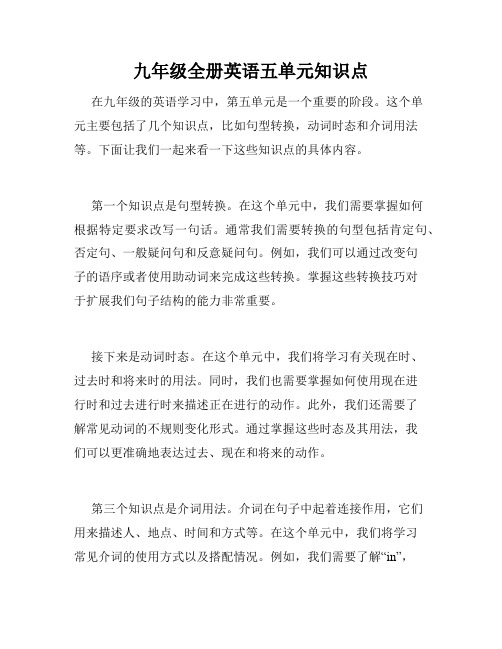
九年级全册英语五单元知识点在九年级的英语学习中,第五单元是一个重要的阶段。
这个单元主要包括了几个知识点,比如句型转换,动词时态和介词用法等。
下面让我们一起来看一下这些知识点的具体内容。
第一个知识点是句型转换。
在这个单元中,我们需要掌握如何根据特定要求改写一句话。
通常我们需要转换的句型包括肯定句、否定句、一般疑问句和反意疑问句。
例如,我们可以通过改变句子的语序或者使用助动词来完成这些转换。
掌握这些转换技巧对于扩展我们句子结构的能力非常重要。
接下来是动词时态。
在这个单元中,我们将学习有关现在时、过去时和将来时的用法。
同时,我们也需要掌握如何使用现在进行时和过去进行时来描述正在进行的动作。
此外,我们还需要了解常见动词的不规则变化形式。
通过掌握这些时态及其用法,我们可以更准确地表达过去、现在和将来的动作。
第三个知识点是介词用法。
介词在句子中起着连接作用,它们用来描述人、地点、时间和方式等。
在这个单元中,我们将学习常见介词的使用方式以及搭配情况。
例如,我们需要了解“in”,“on”,“at”等介词在时间和地点上的用法差异。
通过正确运用介词,我们可以让我们的句子更加连贯和准确。
除了以上三个主要的知识点外,这个单元还包括其他一些相关内容。
例如,我们需要学习如何使用连词来连接句子和段落,以及如何使用形容词和副词来丰富我们的描述。
此外,我们还需要掌握如何使用情态动词来表达可能性、能力和建议等。
通过学习这些知识点,我们可以提高我们的英语语言技能。
在应用这些知识点时,我们可以多阅读英语文章,多进行口语练习,以加深对这些知识点的理解和应用。
总结一下,九年级全册英语五单元的知识点包括句型转换,动词时态和介词用法等。
通过学习这些知识点,我们可以更好地表达自己的意思,并使我们的语言更加地准确和流畅。
希望大家认真学习,取得好成绩!。
九年级英语第五单元重要知识点
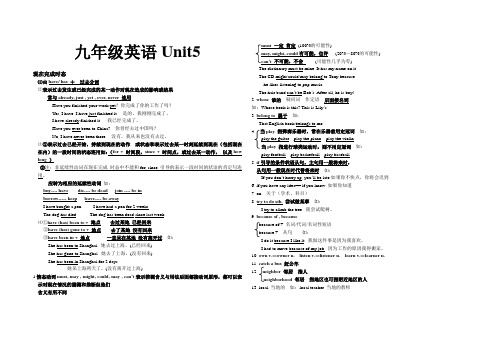
九年级英语Unit5现在完成时态⑴由have/ has +过去分词⑵表示过去发生或已经完成的某一动作对现在造成的影响或结果常与already, just , yet , ever, never 连用Have you finished your work yet?你完成了你的工作了吗?Yes, I have. I have just finished it.是的。
我刚刚完成了。
I have already finished it .我已经完成了。
Have you ever been to China?你曾经去过中国吗?No, I have never been there.没有,我从来也没有去过。
⑶①表示过去已经开始,持续到现在的动作或状态和表示过去某一时刻延续到现在(包括现在在内)的一段时间的状态连用如:(for + 时间段,since + 时间点,或过去某一动作,以及how long )②注:非延续性动词在现在完成时态中不能和for, since 引导的表示一段时间的状语的肯定句连用。
应转为相应的延续性动词如:buy---- have die---- be dead join ---- be inborrow----- keep leave---- be awayI have bought a pen.------ I have had a pen for 2 weeks.The dog has died.------- The dog has been dead since last week.⑷①have (has) been to + 地点去过某地已经回来②have (has) gone to + 地点去了某地没有回来③have been in + 地点一直呆在某地没有离开过如:She has been to Shanghai. 她去过上海。
(已经回来)She has gone to Shanghai. 她去了上海。
九年级英语unit5重点知识点

九年级英语unit5重点知识点Introduction英语是一门国际语言,掌握好英语对我们的学习和未来的发展都非常重要。
而九年级英语Unit5是我们学习英语的关键阶段,掌握好这些重点知识点将对我们的学习产生积极的影响。
本文将详细介绍九年级英语Unit5重点知识点,帮助我们更好地理解和掌握这些知识。
1. 词汇学习1.1 动词短语英语中常用的动词短语对我们的语言表达非常重要。
在Unit5中,我们学习了一些常见的动词短语,例如:“look forward to”(期待),“give up”(放弃),“take care of”(照顾)等等。
通过积累并灵活运用这些动词短语,我们可以提高我们的写作和口语表达能力。
1.2 词义辨析英语中常常有一些词义相近的单词,但它们的细微差别对于我们正确使用非常重要。
在Unit5中,我们学习了一些词义相近但用法有所区别的词汇,例如:“travel”(旅行)和“trip”(旅程),“break”(打破)和“damage”(损坏)等等。
掌握这些词汇的细微差别,有助于我们更加准确地表达自己的意思。
2. 语法学习2.1 过去进行时过去进行时是我们在描述过去某个特定时间正在进行的动作时经常使用的时态。
在Unit5中,我们学习了过去进行时的构成和用法。
例如:“I was studying when she called”(她打电话时,我正在学习)。
理解和正确运用过去进行时可以使我们的叙述更加生动有趣。
2.2 条件句条件句是我们在表达假设、可能性或者特定条件下会发生的事情时常常使用的句型。
在Unit5中,我们学习了三种类型的条件句:零条件句,一般条件句和虚拟条件句。
例如:“If it rains, we will stay at home”(如果下雨,我们会呆在家里)。
学习并熟练运用这些条件句结构,有助于我们更好地表达自己的意思和理解他人的观点。
3. 阅读理解3.1 阅读技巧阅读理解是英语学习中非常重要的一项能力。
九年级unit5笔记

九年级unit5笔记一、单词与短语enthusiastic:热情的,热心的devote:投入,奉献ambassador:大使doubt:怀疑custom:习惯,风俗awkward:尴尬的awkwardly:尴尬地occasion:场合tie:领带embarrassed:尴尬的二、句子结构与表达一般过去时态的用法:用于描述过去发生的事情。
例如:“Last week, we visited the Great Wall.”情态动词的用法:如“could”, “should”和“would”。
例如:“He said he could finish the task by tomorrow.”被动语态的用法:例如:“The book was written by him.”虚拟语气的用法:用于表示假设或与现实相反的情况。
例如:“If I were you, I would take the job.”定语从句的用法:例如:“The man who spoke at the meeting is my boss.”三、语法重点现在完成时的用法:表示过去发生的动作对现在有影响。
结构为“have/has + 过去分词”。
例如:“I have already finished my homework.”形容词的用法:描述名词的性质或状态。
例如:“She is beautiful.”副词的用法:描述动词、形容词或其他副词的性质或状态。
例如:“He runs quickly.”介词的用法:表示事物之间的关系。
例如:“I am interested in this project.”连词的用法:连接词与词、短语与短语、句子与句子。
例如:“Although he is young, he knows a lot.”四、作文练习写一篇关于一次难忘的经历的短文,描述事件发生的过程和你的感受。
使用现在完成时和一般过去时态描述。
九年级英语第五单元知识点总结

九年级英语第五单元知识点总结一、重点单词1. belong- 用法:belong to sb. / sth.,表示“属于某人/某物”,无被动语态,也不用于进行时态。
例如:This book belongs to me.(这本书属于我。
)2. picnic- 相关短语:go for a picnic(去野餐);have a picnic(进行野餐)。
例如:We are going for a picnic this weekend.(我们这个周末打算去野餐。
)3. author4. hair band- 词义:发带。
例如:I found a hair band on the playground.(我在操场上发现了一个发带。
)5. possibly- 词性:副词,词义:可能地;也许。
例如:It may possibly rain tomorrow.(明天也许会下雨。
)6. drop- 用法:- 作动词,有“落下;掉下;使落下”等意思。
例如:He dropped his pen on the floor.(他把笔掉在地上了。
)- 还可表示“放弃(想法、计划等)”,例如:He dropped the idea of going abroad.(他放弃了出国的想法。
)- 相关短语:drop by(顺便访问);drop in on sb.(顺便拜访某人);drop off(减少;让……下车)。
7. symphony- 词义:交响乐;交响曲。
例如:Beethoven wrote many famous symphonies.(贝多芬写了许多著名的交响曲。
)8. optometrist- 词义:验光师;配镜师。
例如:You should go to an optometrist to check your eyesight.(你应该去验光师那里检查视力。
)9. appointment- 用法:make an appointment(预约);have an appointment(有约会)。
九年级英语unit 5 知识点总结

九年级英语unit 5 知识点总结Unit 5 Knowledge Point Summary (九年级英语知识点总结)Unit 5 in ninth-grade English covers various language skills and topics, including present and past participles, reported speech, adverbs of frequency, and expressing preferences. In this article, we will summarize the key points and provide examples to enhance understanding. Let's dive in!1. Present and Past ParticiplesParticiples are verb forms that can function as adjectives. There are two types: present participles and past participles.- Present participles: formed by adding "-ing" to the base form of the verb (e.g., running, swimming).- Past participles: regular verbs formed by adding "-ed" to the base form of the verb (e.g., played, watched), and irregular verbs have specific forms (e.g., written, spoken).Examples:- She has read an interesting book. ("interesting" is the past participle)- The running water sounds soothing. ("running" is the present participle)2. Reported SpeechReported speech is used to convey someone else's words or ideas. When reporting, we generally change the tenses, pronouns, and time expressions.- Direct speech: "I love ice cream," said Sarah.- Reported speech: Sarah said (that) she loved ice cream.Examples:- "I will go to the cinema," said Tom.→ Tom said he would go to the cinema.- "We have finished our homework," they said.→ They said they had finished their homework.3. Adverbs of FrequencyAdverbs of frequency describe how often an action occurs. They are commonly used with the simple present tense.- Adverbs of frequency include always, usually, often, sometimes, rarely, and never.- Generally, these adverbs are placed before the main verb in a sentence.Examples:- I always eat breakfast before school.- He rarely goes to bed early.- They usually study together on weekends.4. Expressing PreferencesTo express preferences, we use phrases such as "prefer," "would rather," and "like." The structure often involves the verb "prefer" + "to" or "rather than."- "Prefer to" is used when comparing two actions.- "Prefer -ing" is used when comparing two things or activities.Examples:- I prefer tea to coffee. (comparing two drinks)- She would rather stay at home than go to the party. (comparing staying at home and going to the party)- He likes swimming more than cycling. (comparing swimming and cycling)In conclusion, Unit 5 covers important English language skills, including present and past participles, reported speech, adverbs of frequency, and expressing preferences. By understanding these concepts, students can enhance their grammar, vocabulary, and overall language proficiency. Practice using these knowledge points in various contexts to solidify your understanding and improve your English skills. Keep up the good work!。
九年级英语第五单元知识点

九年级英语第五单元知识点第一部分:动词时态动词时态是英语语法中重要的一部分。
在第五单元中,我们学习了以下几种时态:1. 一般现在时(Simple Present Tense):用来表示客观事实、经常性的动作或习惯等。
例如:I eat breakfast every morning.(每天早晨我都吃早餐。
)2. 一般过去时(Simple Past Tense):用来表示过去发生的动作或状态。
例如:She finished her homework last night.(她昨晚完成了她的作业。
)3. 现在进行时(Present Continuous Tense):用来表示现阶段正在进行的动作。
例如:They are playing basketball in the park.(他们正在公园里打篮球。
)4. 过去进行时(Past Continuous Tense):用来表示过去某一时刻正在进行的动作。
例如:He was watching TV when I called him.(当我给他打电话时,他正在看电视。
)5. 将来时(Future Tense):用来表示将来发生的动作或状态。
例如:We will visit our grandparents next weekend.(我们下个周末会去看望我们的祖父母。
)第二部分:被动语态被动语态是英语中一种常用的语法结构。
在第五单元中,我们学习了如何构成被动语态。
被动语态的构成方式是:be动词(am/is/are/was/were)+过去分词。
1. 一般现在时的被动语态:am/is/are + 过去分词。
例如:The book is written by Mark Twain.(这本书是马克·吐温写的。
)2. 一般过去时的被动语态:was/were + 过去分词。
例如:The film was directed by Steven Spielberg.(这部电影是由史蒂文·斯皮尔伯格导演的。
九年级unit5的知识点总结
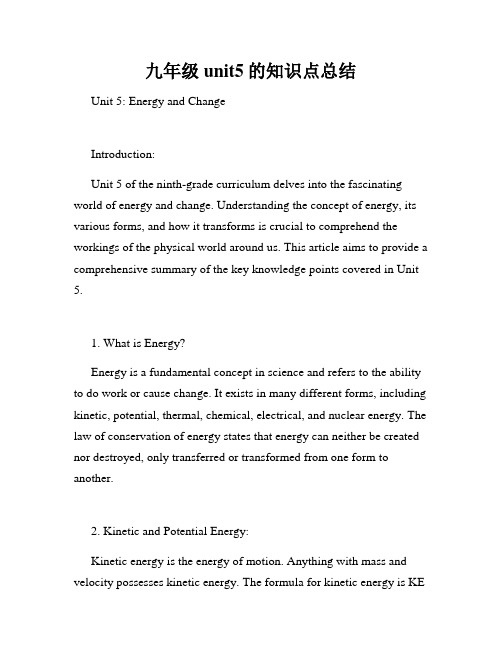
九年级unit5的知识点总结Unit 5: Energy and ChangeIntroduction:Unit 5 of the ninth-grade curriculum delves into the fascinating world of energy and change. Understanding the concept of energy, its various forms, and how it transforms is crucial to comprehend the workings of the physical world around us. This article aims to provide a comprehensive summary of the key knowledge points covered in Unit 5.1. What is Energy?Energy is a fundamental concept in science and refers to the ability to do work or cause change. It exists in many different forms, including kinetic, potential, thermal, chemical, electrical, and nuclear energy. The law of conservation of energy states that energy can neither be created nor destroyed, only transferred or transformed from one form to another.2. Kinetic and Potential Energy:Kinetic energy is the energy of motion. Anything with mass and velocity possesses kinetic energy. The formula for kinetic energy is KE= 1/2 mv², where m represents mass and v signifies velocity. On the other hand, potential energy refers to stored energy due to an object's position or state. There are various forms of potential energy, such as gravitational potential energy, elastic potential energy, and chemical potential energy.3. Energy Transformation:Energy constantly transforms from one form to another. For instance, when a ball is thrown into the air, its initial kinetic energy gradually converts into potential energy as it gains height. Then, as it comes back down, potential energy changes back into kinetic energy. This interconversion of energy is evident in various daily life scenarios and plays a crucial role in understanding the natural phenomenon.4. Energy Efficiency:Energy efficiency is a significant concept in today's world, where conserving energy and minimizing waste is vital for sustainability. It refers to the ratio of useful energy output to total energy input. The higher the energy efficiency, the more effective the system is in converting energy into useful work. Efficient energy usage helps reduce environmental impact and lower energy costs.5. Renewable and Non-Renewable Energy Sources:Understanding different energy sources is essential for sustainable resource management. Renewable energy sources derive from continuously replenishable resources, such as sunlight, wind, water, and biomass. These sources have minimal negative impacts on the environment and offer long-term sustainability. In contrast, non-renewable energy sources, like fossil fuels (coal, oil, and natural gas), are finite and take millions of years to form. Over-reliance on non-renewable sources poses environmental concerns and depletes Earth's limited resources.6. Energy Transfer and Generation:Energy transfer occurs when energy moves from one system to another without changing its form. For example, heat transfer occurs through conduction, convection, and radiation. Energy generation involves the process of converting one form of energy into another. This includes power plants that generate electricity by converting thermal energy, chemical energy, or nuclear energy into electrical energy.7. Energy Conservation:Energy conservation emphasizes minimizing energy usage by reducing waste and implementing efficient practices. This includes actions such as turning off lights and appliances when not in use,utilizing energy-efficient technologies, optimizing building insulation, and promoting sustainable transportation options. Energy conservation not only reduces environmental impact but also aids in mitigating climate change and ensuring a sustainable future.Conclusion:Unit 5 covers a wide range of knowledge points related to energy and change. By understanding the various forms of energy, energy transformation, efficiency, renewable and non-renewable sources, energy transfer, generation, and conservation, students gain a comprehensive understanding of the fundamental principles governing energy in the physical world.。
九年级英语unit5知识点梳理

九年级英语unit5知识点梳理在九年级英语的学习中,unit5是一个重要的单元。
在这个单元中,我们将学习一些有关音乐和电影的内容。
本文将对该单元的知识点进行梳理和总结,以帮助大家更好地理解和掌握。
第一部分:音乐1. 音乐类型在这个单元中,我们将学习各种不同类型的音乐,如流行音乐、摇滚音乐、古典音乐等。
了解不同类型的音乐有助于我们拓宽音乐视野,丰富我们的音乐欣赏能力。
2. 音乐家和乐队在这个单元中,我们将学习一些著名的音乐家和乐队,如贝多芬、披头士乐队等。
通过学习,我们可以更好地了解他们的音乐成就和对音乐的贡献。
3. 音乐研究在这个单元中,我们将学习如何进行音乐研究,包括如何选择研究题目、如何收集和分析数据等。
音乐研究不仅能够增加我们对音乐的了解,还有助于培养我们的科学研究能力。
第二部分:电影1. 电影类型在这个单元中,我们将学习各种不同类型的电影,如喜剧、动作片、科幻片等。
了解不同类型的电影有助于我们拓宽对电影的认识,提高我们的电影品味。
2. 电影票房在这个单元中,我们将学习关于电影票房的知识,如如何统计票房、如何评估一部电影的成功与否等。
了解电影票房有助于我们更好地了解电影市场的运作规律。
3. 影评与影评人在这个单元中,我们将学习一些影评的写作技巧,并了解一些著名的影评人,如罗杰·艾伯特等。
通过学习,我们可以培养自己的影评写作能力,提高我们对电影的专业分析能力。
第三部分:跨文化交流在这个单元中,我们将学习音乐和电影对于跨文化交流的重要性。
通过学习不同国家和地区的音乐和电影,我们可以更深入地了解不同文化和传统。
1. 音乐和文化音乐是不同文化的重要组成部分。
通过学习音乐,我们能够更好地了解不同国家和地区的文化和习俗。
2. 电影和文化电影作为一种重要的文化表达形式,能够深入人心。
通过学习电影,我们可以更好地了解不同文化的思想和价值观。
结语:通过对九年级英语unit5的知识点进行梳理和总结,我们可以更好地理解和掌握这个单元的内容。
九年级英语unit5知识点总结
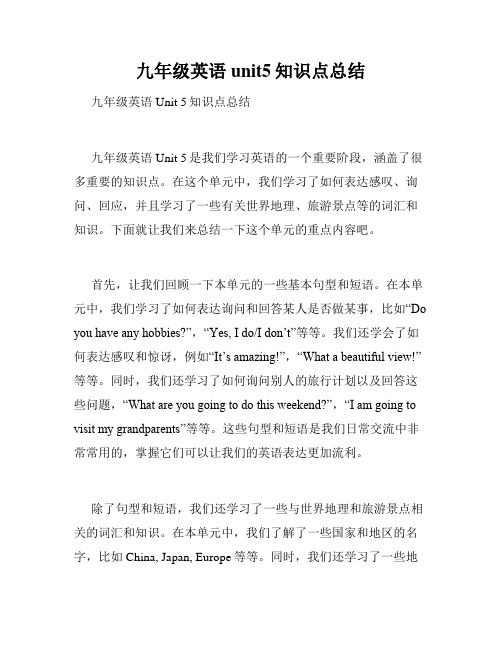
九年级英语unit5知识点总结九年级英语Unit 5知识点总结九年级英语Unit 5是我们学习英语的一个重要阶段,涵盖了很多重要的知识点。
在这个单元中,我们学习了如何表达感叹、询问、回应,并且学习了一些有关世界地理、旅游景点等的词汇和知识。
下面就让我们来总结一下这个单元的重点内容吧。
首先,让我们回顾一下本单元的一些基本句型和短语。
在本单元中,我们学习了如何表达询问和回答某人是否做某事,比如“Do you have any hobbies?”,“Yes, I do/I don’t”等等。
我们还学会了如何表达感叹和惊讶,例如“It’s amazing!”,“What a beautiful view!”等等。
同时,我们还学习了如何询问别人的旅行计划以及回答这些问题,“What are you going to do this weekend?”,“I am going to visit my grandparents”等等。
这些句型和短语是我们日常交流中非常常用的,掌握它们可以让我们的英语表达更加流利。
除了句型和短语,我们还学习了一些与世界地理和旅游景点相关的词汇和知识。
在本单元中,我们了解了一些国家和地区的名字,比如China, Japan, Europe等等。
同时,我们还学习了一些地理位置词汇,比如north, south, east, west等等。
这些词汇在我们描述地点或者讨论旅行计划时非常实用。
此外,我们还学习了如何描述旅行中的各种景点和活动。
在本单元的课文中,我们了解了一些世界著名旅游城市和景点,比如Paris, the Great Wall, the Eiffel Tower等等。
我们还学会了如何用英语来描述这些景点的特点和吸引力,“The Great Wall is one of the wonders of the world”等等。
这不仅可以帮助我们更好地了解世界各地的文化,还可以丰富我们的词汇和句子结构。
九年级unit5知识归纳
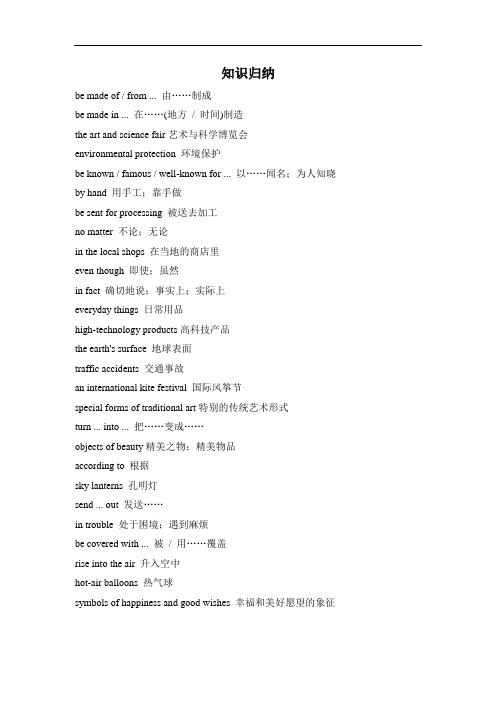
知识归纳be made of / from ... 由……制成be made in ... 在……(地方/ 时间)制造the art and science fair艺术与科学博览会environmental protection 环境保护be known / famous / well-known for ... 以……闻名;为人知晓by hand 用手工;靠手做be sent for processing 被送去加工no matter 不论;无论in the local shops 在当地的商店里even though 即使;虽然in fact 确切地说;事实上;实际上everyday things 日常用品high-technology products高科技产品the earth's surface 地球表面traffic accidents 交通事故an international kite festival 国际风筝节special forms of traditional art特别的传统艺术形式turn ... into ... 把……变成……objects of beauty精美之物;精美物品according to 根据sky lanterns 孔明灯send ... out 发送……in trouble 处于困境;遇到麻烦be covered with ... 被/ 用……覆盖rise into the air 升入空中hot-air balloons 热气球symbols of happiness and good wishes 幸福和美好愿望的象征paper cutting 剪纸as far as I know 就我所知Chinese clay art 中国泥塑艺术fairy tale 童话/ 神话故事historical story 历史故事at a very high heat 在高温下be used for doing sth.(= be used to do sth.) 被用来做某事avoid doing sth. 避免做某事。
九年级英语第五单元知识点
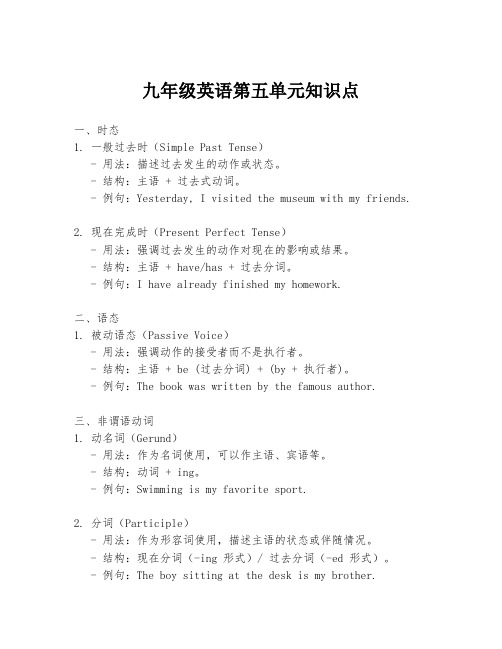
九年级英语第五单元知识点一、时态1. 一般过去时(Simple Past Tense)- 用法:描述过去发生的动作或状态。
- 结构:主语 + 过去式动词。
- 例句:Yesterday, I visited the museum with my friends.2. 现在完成时(Present Perfect Tense)- 用法:强调过去发生的动作对现在的影响或结果。
- 结构:主语 + have/has + 过去分词。
- 例句:I have already finished my homework.二、语态1. 被动语态(Passive Voice)- 用法:强调动作的接受者而不是执行者。
- 结构:主语 + be (过去分词) + (by + 执行者)。
- 例句:The book was written by the famous author.三、非谓语动词1. 动名词(Gerund)- 用法:作为名词使用,可以作主语、宾语等。
- 结构:动词 + ing。
- 例句:Swimming is my favorite sport.2. 分词(Participle)- 用法:作为形容词使用,描述主语的状态或伴随情况。
- 结构:现在分词(-ing 形式)/ 过去分词(-ed 形式)。
- 例句:The boy sitting at the desk is my brother.四、情态动词1. can/could, may/might, must, should/ought to- 用法:表达可能性、建议、义务或必要性。
- 例句:- Can you help me with this math problem?- You should study for the test.- It might rain later, so take an umbrella.五、句型结构1. 条件句(Conditional Sentences)- 用法:表达在特定条件下可能发生的结果。
九年级Unit5知识点

Unit5 单元重点归纳一、重点短语be made of 由……制成的(表示制成成品后,仍可看出原材料是什么)be made from 由……制成的(在成品中已无法辨认原材料)be known for 以……闻名be used for 被用于……no matter 不论;无论be covered with 用……覆盖as far as I know 据我所知by hand 用手be good for 对……有益on the last Friday of each month 在每个月的最后一个星期五be good at 擅长make high-technology products 制造高科技产品the earth’s surface 地球表面different kinds of 不同种类的fly a kite 放风筝such as 例如according to 根据按照ask for help 请求帮助 a symbol of ……的象征put…on… 把……放在……上good luck 好运at a very high heat 在高温下be made in 在……制造的be famous for 以……著名on the sides of mountains 在山腰上all over the world=around the world 全世界traffic accident 交通事故a kite festival 风筝节be from 来自turn…into…把……变成……send out 放出in trouble 处于困境中rise into 上升上涨paper cutting 剪纸be used by 被……使用during the Spring Festival 在春节期间sky lanterns 孔明灯二、重点结构1. 被动语态:Be+及物动词的过去分词2. No matter +从句“无论”3. find it +形容词+that 从句“发现……是怎样的”4. it seems that +从句“好像”5. buy sb. sth. =buy sth for sb 给某人买某物6. avoid doing sth 避免做某事7. allow sb to do sth 允许某人做某事三、辨析1. be made of, be made from与be made inbe made of 意为“是……(原材料)制成的”。
九年级英语unit5知识点讲解
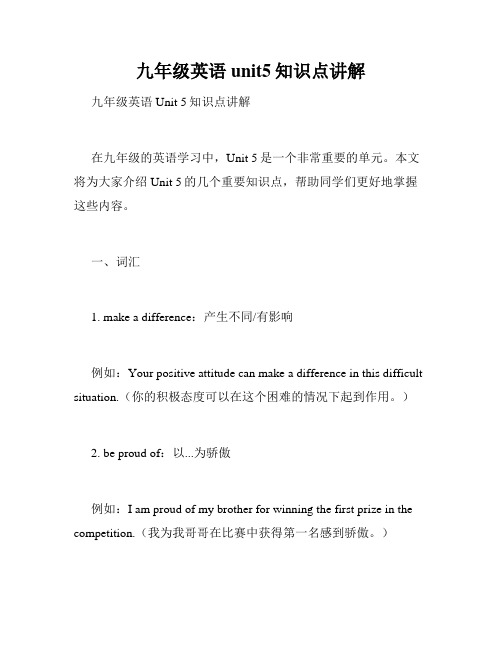
九年级英语unit5知识点讲解九年级英语Unit 5知识点讲解在九年级的英语学习中,Unit 5是一个非常重要的单元。
本文将为大家介绍Unit 5的几个重要知识点,帮助同学们更好地掌握这些内容。
一、词汇1. make a difference:产生不同/有影响例如:Your positive attitude can make a difference in this difficult situation.(你的积极态度可以在这个困难的情况下起到作用。
)2. be proud of:以...为骄傲例如:I am proud of my brother for winning the first prize in the competition.(我为我哥哥在比赛中获得第一名感到骄傲。
)3. take part in:参加例如:I want to take part in the school talent show.(我想参加学校的才艺表演。
)4. set goals:设定目标例如:In order to achieve success, it's important to set goals for yourself.(为了取得成功,设定目标对你很重要。
)5. achieve success:取得成功例如:With hard work and determination, I believe you can achieve success in whatever you do.(凭借努力和决心,我相信你无论做什么都能够取得成功。
)二、语法1. It is/was + 形容词 + to do sth.: 做某事是/感到某种感觉例如:It is interesting to learn a new language.(学习一门新语言很有趣。
)2. Would like to + 动词原形:想要做某事例如:I would like to travel around the world one day.(有一天我想环游世界。
九年级英语第5单元知识点
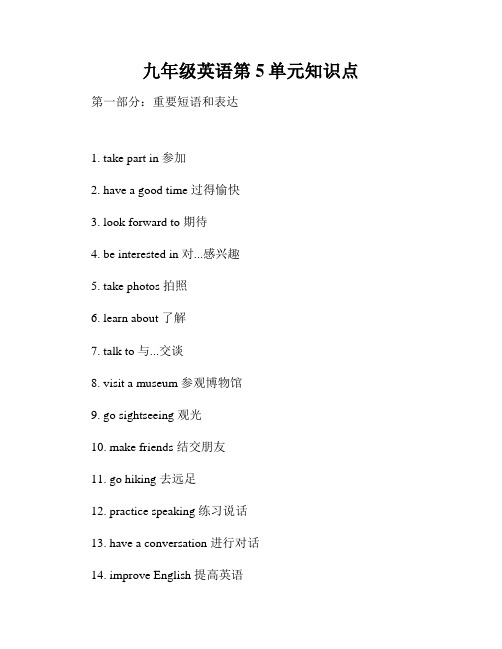
九年级英语第5单元知识点第一部分:重要短语和表达1. take part in 参加2. have a good time 过得愉快3. look forward to 期待4. be interested in 对...感兴趣5. take photos 拍照6. learn about 了解7. talk to 与...交谈8. visit a museum 参观博物馆9. go sightseeing 观光10. make friends 结交朋友11. go hiking 去远足12. practice speaking 练习说话13. have a conversation 进行对话14. improve English 提高英语15. discuss with 与...讨论16. ask for 告诉17. show interest in 对...感兴趣18. stay at a hotel 住在酒店19. visit famous landmarks 参观著名景点20. arrive in 到达第二部分:语法知识点1. 现在进行时:表示现在正在进行的动作或状态。
e.g. I am studying English now.(我现在正在学英语。
)2. 一般过去时:表示过去发生的动作或状态。
e.g. We visited the Great Wall last week.(我们上周参观了长城。
)3. 一般将来时:表示将来要发生的动作或状态。
e.g. She will go to the party tomorrow.(她明天要去参加派对。
)4. 情态动词should:表示应该或建议做某事。
e.g. You should listen to your teacher.(你应该听老师的话。
)5. 使用年月日表达日期的方式。
e.g. Today is June 12th, 2022.(今天是2022年6月12日。
九年级英语第五单元重要知识点归纳(整理打印版)
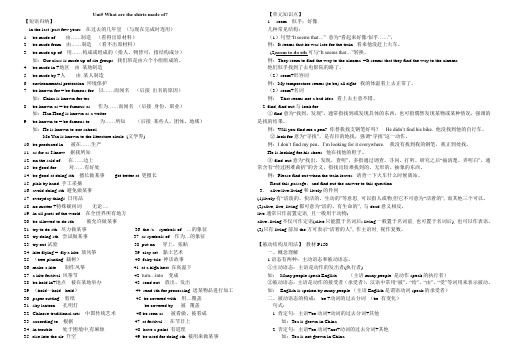
Uni5 What are the shirts made of?【短语归纳】in the last /past few years 在过去的几年里(与现在完成时连用)1.be made of 由……制造(看得出原材料)2.be made from 由……制造(看不出原材料)3.be made up of 用……构成或组成的(指人、物皆可,指结构成分)如:Our class is made up of six groups. 我们班是由六个小组组成的。
4.be made in +地区由某地制造5.be made by +人由某人制造6.environmental protection 环境保护7.be known for = be famous for 以……而闻名(后接出名的原因)如:China is known for tea.8.be known as = be famous as 作为……而闻名(后接身份、职业)如:Han Hong is known as a writer.9.be known to = be famous to 为……所知(后接某些人、团体、地域)如:He is known to our school.Mo Yan is known to the literature circle. (文学界)10.be produced in 被在……生产11.as far as I know 据我所知12.on the said of 在……边上13.be good for 对……有好处14.be good at doing sth 擅长做某事get better at 更擅长15.pick by hand 手工采摘16.avoid doing sth 避免做某事17.everyday things 日用品18.no matter +特殊疑问词无论….19.in all parts of the world 在全世界所有地方20.be allowed to do sth 被允许做某事21.try to do sth. 尽力做某事36. the /a symbols of …的象征22.try doing sth. 尝试做某事37. as symbols of 作为…的象征23.try out试验38. put on 穿上、张贴24.kite flying =fly a kite 放风筝39. clay art 黏土艺术25.(tree planting 栽树)40. fairy tale 神话故事26.make a kite 制作风筝41. at a high heat 在高温下27.a kite festival 风筝节42. turn…into变成28.be held in+地点被在某地举办43. send out 放出,发出29.(hold—held-- held)44. send sth for processing 送某物品进行加工30.paper cutting 剪纸45. be covered with 用…覆盖31.sky lantern 孔明灯. be covered by 被...覆盖32.Chinese traditional arts 中国传统艺术46.be seen as 被看做、被看成33.according to 根据47. at festival 在节日上34.in trouble 处于困境中,有麻烦48. have a point 有道理35.rise into the air 升空49. be used for doing sth 被用来做某事【单元知识点】1.seem 似乎;好像几种常见结构:(1)句型“It seems that…”意为“看起来好像/似乎……”,例:It seems that he was late for the train. 看来他没赶上火车。
- 1、下载文档前请自行甄别文档内容的完整性,平台不提供额外的编辑、内容补充、找答案等附加服务。
- 2、"仅部分预览"的文档,不可在线预览部分如存在完整性等问题,可反馈申请退款(可完整预览的文档不适用该条件!)。
- 3、如文档侵犯您的权益,请联系客服反馈,我们会尽快为您处理(人工客服工作时间:9:00-18:30)。
Unit5 Section A 1a-2d 知识提纲一、词形转换1.environment n. 环境→adj. environmental 自然环境的,有关环境的2.leaf n. 叶,叶子→复数(pl.)leaves3 wide adj. 宽的,宽阔的→adv. widely 广泛地,普遍地二、短语1. be known for 以……闻名,= be famous for2.be made of 由……制成3. be made from 由……制成4. be made in + 地点产于某地5. all over the world 全世界6. by hand 手工地7. be good for 对……有益8. on the side of the mountains 在山边上三、词法和句法1.be made of“由…制成”主语为制成品of 后接原材料,制成品能看见原材料。
be made from“由…制成”主语为制成品from后接原材料,成品看不见原材料。
be made in + 地点某物产于某地The desk wood . 桌子是由木头做的。
Paper wood . 纸是由木材做的。
The kind of watch Shanghai .这种手表产于上海。
2.as far as I know 据我所知据我所知,李先生已经去美国了。
I know ,Mr. Li has gone to America.3. both …and ………和……都……,不但……而且……连接主语时,动词为复数。
not only …but also…不但……而且……连接主语时,动词就近原则。
either …or…或者……或者……连接主语时,动词就近原则。
neither…nor…既不……也不……连接主语时,动词就近原则。
Tom Jack know my address . They often drop by my home .A.Not , butB. Both , andC. Either , orD. Not only , but also4. It seems that ………似乎……seem + adj. / seem to do sthIt seems that he is going to leave here . 似乎他要离开这里。
= He seems to leave here .Unit5 Section A 3a-4c 知识提纲(P35-36)一、词形转换1. produce v. 生产,制造→n.product 产品2. France n. 法国→adj. French法国的3.Germany n. 德国→adj.German 德国的二、词法和句法1. search for 搜寻,寻找相当于look for2.no matter 不论,无论后接特殊疑问词how / when / where /which/who /what= 特殊疑问词+ ever 表示“无论怎样/ 何时/哪里/哪个/谁/什么”引导让步状语从句。
No matter what he does , I believe him . = he does , I believe him .3. hardly adv. 几乎不表示否定含义I can hardly hear you , ?4. avoid v. 避免,回避avoid doing sth . 避免做某事You should avoid such a mistake . (make)5. be good for 对……有益be good at 擅长be good with sb. 与……和睦相处be good to 对……好6. everyday adj. 每天的,日常的every day 每日,每天相当于频率副词,做时间状语。
He reads everyday English every day . 他每天都读日常英语。
7. continue v. 继续,连续continue to do sth . 继续/ 接着做另一件事情continue doing sth . 继续做原来的事情After he finished reading a novel , he continued to play games with his friends .他读完小说后跟朋友们继续玩游戏。
8.find (found , found ) v. 发现,发觉find it + adj. + to do sth .I find it very difficult to learn English well . 我觉得学好英语很难。
find it + adj. + that-clause 是一个复合句,it是形式宾语,that从句是真宾语。
I find it relaxing that I can lie on the beach .我发现我能躺在海滩上很令人放松。
find sb. doing sth . 发现某人正在做某事I found some boys swimming in the river .我发现一些男孩正在河里游泳。
Unit5 Section B1a-2b 知识提纲一、词形转换1. international adj. 国际的→ n. internation 国际2. celebrate v. 庆祝→n. celebration 庆典,庆祝活动3.live v.生活→ adj. lively 生气勃勃的4. history n. 历史→ adj. historical 历史的4. complete adj. 完整的,完全的→pletely完全地,完整地二、短语1. find out 弄清楚,查明2. go on vacation (to)去度假3.turn into 变成4.according to 根据,按照5.in trouble 在困境中6.be covered with 被……覆盖三、词法和句法1. Have / has been around 这是习语,意思是“已经存在”Poetry has been around for centuries . 诗歌已经存在几个世纪了。
2.allow v. 允许,准许allow doing sth 允许做某事allow sb. to do sth 允许某人做某事be allowed to do sth . 被允许做某事It’s not allowed to smoke here . 这儿不允许吸烟。
3. use v. 使用use sth. to do sth. 用某物做某事。
be used to do sth. 被用来做某事be / get used to + n. / pron. / doing sth . 习惯于做某事be used for doing sth . 用来做某事=be used to do sth .4.It took me about half an hour to get to the airport .I spent two yuan buying / on the pen .The pen cost me two yuan .Grammar(语法)被动语态一、语态概述英语中有两种语态:主动语态和被动语态。
英语的语态是通过动词形式的变化表现出来的。
主动语态表示主语是动作的执行者。
例如:Many people speak English. 主语people是动词speak的发出者。
被动语态表示主语是动作的承受者。
例如:English is spoken by many people. 主语English是动词speak的承受者。
二、被动语态的构成被动语态由“be+及物动词的过去分词”构成。
不及物动词本身没有被动语态。
人称、数和时态的变化是通过be的变化表现出来的。
三、各种时态被动语态的构成1.一般现在时:am/is/are+动词过去分词Cars are made by them.2.一般过去时:was/were+动词过去分The MP3 was bought by my father.3.含有情态动词的被动语态,由“情态动词+be+过去分词”构成,例如:we can repair this watch in two days.→This watch can be repaired in two days.四、主动语态变被动语态的方法1.把主动语态的宾语变为被动语态的主语。
2.把主动语态的谓语变为被动语态的谓语。
3.把主动语态的主语变为被动语态的by短语。
(① by短语可以省。
② by短语后跟代词的宾格。
)主变被解题步骤1. 划分句子成分,找宾语----即动作的承受者2. 判断宾语的单复数----即be动词的单复数.3. 判断动词的时态----即be动词的时态.4. 修改谓语的形式----即原句动词改为过去分词5. 修改原句的主语----即by+ 宾语(原主语).→Shoes are made by them.(宾变主,主变宾,谓动变成be done 形,人称、数、格随着变)五、被动语态的用法(1)不知道或没有必要说明动作的执行者是谁。
Some new computers were stolen last night. (不知道电脑是谁偷的)(2)强调动作的承受者,而不强调动作的执行者。
The window was broken by mike.窗户是迈克打破的。
巩固提升:一、单项填空( )1.The old man is good ________swimming, and even now he often swims across Tuojiang River after supper. A.over B.through C.to D.at( )2.—Your sweater looks nice.Is it made of wool?—Yes, and it's made ________ Shanghai.A.by B.in C.for D.from( )3.Sanya is famous ________ its beautiful beaches.A.of B.for C.as D.from( )4.________ happens, I'll stand by you.A.So B.ButC.Or D.No matter what( )5.My parents don't allow me to ________ out at night.A.went B.goingC.go D.goes( )6.I have some good friends, ________ dogs, cats and toys.A.as for B.such asC.for example D.suddenly( )7.Miss Taylor never wastes money on anything too expensive, even though she can ________ to.She has donated much of the money she saved to charities.A.allow B.remindC.afford D.take( )8.When you are ________, I will help you.A.in trouble B.in helpC.with trouble D.in hope( )9.The whole city is ________ fog.A.cover with B.covered withC.cover D.covered( )10.—How do you study for a test?—________ working with friends.A.By B.WithC.On D.At( )11.The sweater is not the right ________ for me.—Well, shall I get you a bigger one or a smaller one?A.price B.colorC.size D.material( )12.I've got several novels written by Mo Yan.You can borrow ________ if you like.A.it B.oneC.every D.either( )13.I like to read English in the garden because the flowers in it smell ________.A.good B.wellC.bad D.badly( )14.—“Frog”, Mo Yan's latest novel, please!—Sorry, it ________.But it will come out again soon.A.sold out B.is sold outC.has sold outD.were sold out( )15.—How often do you chat with your friends online?—________ I'm busy with my study.A.Only one month.B.About twice a month.C.Almost every day.D.Maybe in two weeks.( )16.Many trees and flowers ________ in our school every year and they make our school a beautiful garden.A.have planted B.are plantedC.were planted D.will be planted( )17.If our government ________ attention to controlling food safety now, our health ________ in danger.A.won't pay; isB.doesn't pay; isC.won't pay; will beD.doesn't pay; will be( )18.Steve got over ten letters _______ his pen pals _______ their New Year's resolutions last year.A.from; about B.to; ofC.about; from D.to; about( )19.I ________ to the cinema.Would you like to come with me?A.go B.am goingC.have gone D.went( )20.—Could you tell me________ at nine o'clock last night?—Er, I was washing clothes.A.what you were doingB.what were you doingC.what you are doingD.what are you doing二、书面表达假设某中学生英文报开展关于村庄变化的征文活动,请你根据下表所提示的要点,以“Change in Our Town”为题,注意:1.表达中必须包含所给的要点,可以适当发挥,不要简单翻译。
